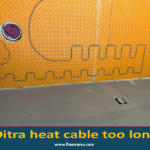In Floor Pool Cleaning System uses jets to push debris towards a drain, keeping the pool clean automatically. These systems are low-maintenance and can increase the pool’s lifespan.
However, they can be costly to install and repair. In-floor cleaning systems work by directing water through cleaning heads strategically placed in the pool, propelling debris toward a drain during cleaning cycles. Regular maintenance is crucial to ensure the system operates efficiently.
Investing in an in-floor pool cleaning system can offer convenience and cleanliness, but it’s important to consider the initial cost and ongoing maintenance expenses.

How In Floor Pool Cleaning System
An in-floor pool cleaning system is a modern and efficient solution to keep your pool clean and well-maintained. These systems work by utilizing a network of cleaning heads built into the pool floor, which work together to ensure thorough cleaning and debris removal. Understanding the mechanisms behind in-floor pool cleaning systems can help you appreciate their effectiveness in maintaining a pristine swimming environment.
Water Flow Mechanism
In-floor pool cleaning systems use the pool’s existing water circulation system. A network of strategically placed cleaning heads is connected to a series of water supply lines, which are in turn connected to the pool’s main pump and filtration system. As the pool’s pump operates, water is directed to the cleaning heads, causing them to pop up and disperse water in a predetermined pattern across the pool floor.
Debris Removal Process
The cleaning heads of an in-floor pool system are designed to not only distribute water but also to agitate and dislodge debris from the pool floor. As the water jets from the cleaning heads move across the pool floor, they create a sweeping motion that pushes debris toward the pool’s main drain. Once the debris reaches the drain, it is removed from the pool’s filtration system, leaving the pool floor clean and free of dirt and debris.
Cost Analysis
When considering installing an in-floor pool cleaning system, conducting a comprehensive cost analysis is essential. Understanding the average cost of these systems and the factors that can affect the overall expense will help you make an informed decision that aligns with your budget and maintenance needs.
Average Cost Of In-floor Pool Cleaning Systems
The average cost of installing an in-floor pool cleaning system can vary significantly depending on several factors, including the pool’s size, the installation’s complexity, and the specific system selected. On average, homeowners can expect to invest between $6,000 and $15,000 for a complete system, including both equipment and installation.
Factors Affecting Cost
Several key factors can influence the cost of an in-floor pool cleaning system:
- Size of the Pool: Larger pools will require more cleaning heads and a more extensive network of pipes, increasing the overall cost of the system.
- Complexity of Installation: If the pool area has challenging terrain or existing structures, the installation process may require additional labor and materials, contributing to higher costs.
- Choice of Cleaning System: Different in-floor cleaning systems offer varying features and technologies, which can impact the overall cost. Robotic systems, for example, may have a higher upfront cost but lower long-term maintenance expenses.
- Additional Customizations: Optional add-ons such as LED lighting, water features, or smart automation capabilities can increase the total cost of the in-floor pool cleaning system.
Considering these factors and obtaining detailed quotes from reputable pool professionals will enable you to make an accurate cost assessment for your specific installation.
Pros And Cons
When considering the best pool cleaning system for your pool, it’s important to weigh the pros and cons of each option to make an informed decision. In-floor pool cleaning systems offer a range of benefits and drawbacks that are essential to consider before purchasing.
Advantages Of In-floor Pool Cleaning Systems
Here are the advantages of in-floor pool cleaning systems:
- Efficient Cleaning: The in-floor cleaning system provides comprehensive and efficient cleaning, ensuring that every area of the pool is thoroughly maintained.
- Automated Operation: An in-floor system automates the cleaning process, reducing the need for manual intervention and saving time.
- Enhanced Aesthetics: This system eliminates the need for visible cleaning equipment, preserving the pool’s aesthetic appeal.
- Improved Water Circulation: In-floor systems promote better water circulation, leading to cleaner and healthier pool water.
- Customization: These systems can be customized to suit the specific shape and size of the pool, ensuring a tailored cleaning approach.
Disadvantages Of In-floor Pool Cleaning Systems
Consider the following disadvantages before opting for an in-floor pool cleaning system:
- High Installation Cost: The initial installation cost of an in-floor system can be higher compared to other cleaning options.
- Complex Maintenance: Maintenance and repairs of in-floor systems can be more complex and costly, requiring professional assistance.
- Limited Compatibility: In-floor systems may not be compatible with certain pool designs, limiting their applicability.
- Potential Malfunctions: The intricate nature of in-floor systems can lead to potential malfunctions, necessitating regular upkeep.
- Limited Effectiveness for Debris: These systems may struggle to clean larger debris, such as leaves and twigs, effectively.
Maintenance And Care
Proper maintenance and care are essential for ensuring the efficient operation and longevity of your in-floor pool cleaning system. Following a few simple tips and knowing how to troubleshoot common issues, you can keep your system in top condition, providing you with a clean and enjoyable swimming experience.
Regular Maintenance Tips
Regular maintenance is crucial for keeping your in-floor pool cleaning system working optimally. Here are some key maintenance tips to follow:
- Monitor Pump and Filter: Regularly check the pump and filter for any signs of blockage or damage.
- Inspect Cleaning Heads: Periodically inspect the cleaning heads to ensure they are free from debris and operating correctly.
- Balance Chemical Levels: Maintain proper chemical levels in the pool to prevent buildup on the cleaning heads and ensure effective cleaning.
- Check Valve Operation: Verify that the in-floor valve is directing water appropriately to the cleaning heads.
- Professional Servicing: Schedule regular professional servicing to address any potential issues and keep the system in peak condition.
Troubleshooting Common Issues
You may encounter common issues with your in-floor pool cleaning system despite regular maintenance. Here are some troubleshooting tips for addressing these issues:
- Uneven Cleaning: Check for obstructions around the cleaning heads and ensure they are properly aligned and functioning.
- Low Water Pressure: Inspect the pump and filter for clogs or damage that may be affecting water pressure.
- Malfunctioning Valves: Verify that the in-floor valve is functioning correctly and directing water as intended.
- Chemical Imbalance: Test and adjust chemical levels to prevent buildup that can impede the cleaning process.
- Professional Assistance: If issues persist, seek professional assistance to diagnose and resolve any underlying problems.
Comparative Analysis
A comparative analysis of in-floor pool cleaning systems can help you decide which system to choose for your pool. These systems use strategically placed cleaning heads to direct a powerful stream of water that propels debris toward the debris drain.
Consider cost, maintenance, and effectiveness when selecting a cleaning system.
Comparison With Other Pool Cleaning Systems
In-floor pool Cleaning Systems use strategically placed cleaning heads to ensure thorough pool cleaning. This system is integrated into the pool’s design, providing a seamless and effective cleaning solution.
Compared to traditional pool cleaners like suction-side or robotic cleaners, in-floor systems offer continuous and automatic cleaning without requiring manual intervention.
Customer Reviews And Recommendations
- Customers praise the efficiency and convenience of in-floor pool cleaning systems.
- Recommendations highlight the long-term cost savings and the enhanced pool maintenance experience.
- Positive reviews emphasize the effectiveness of in-floor systems in keeping pools clean and sparkling.
Frequently Asked Questions
How Much Does An In-floor Pool Cleaning System Cost?
In-floor pool cleaning system costs range from $129. 99 to $1,199, and various options are available to fit different budgets.
Are Floor Pool Cleaners Worth The Money?
In-floor pool cleaners are worth it for their low maintenance and extended pool lifespan. However, consider budget and repair concerns, too.
How Does An In-floor Pool Cleaning System Work?
An in-floor pool cleaning system works by directing water to cleaning heads that rise to push debris towards the drain during each cycle.
How Long Should Pool In Floor Cleaner Run?
For optimal cleaning, run a pool in-floor cleaner for 4-6 hours a day to ensure thorough maintenance.
How Does An In-floor Pool Cleaning System Work?
A Jandy in-floor valve directs water to cleaning heads located strategically throughout the pool. During each cleaning cycle, a group of heads rises slightly from the pool floor to project a powerful stream of water that propels debris toward the debris drain.
Are Floor Pool Cleaners Worth The Money?
If you’re looking for a low-maintenance option to keep your pool clean and increase its lifespan, an in-floor pool cleaning system is a great choice. However, if you’re on a budget or don’t want the hassle of yearly repairs, another type of pool may be better suited for you.
Conclusion
Investing in an in-floor pool cleaning system can be a wise choice for maintaining a clean pool with minimal effort. These systems offer convenience and longevity to your pool, ensuring it stays sparkling without the need for extensive manual cleaning.
Consider the benefits and cost efficiency when deciding on pool maintenance solutions.


